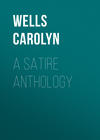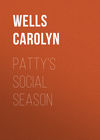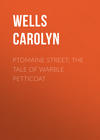Kitabı oku: «A Satire Anthology», sayfa 3
Yazı tipi:
ON SHADWELL
ALL human things are subject to decay,
And, when Fate summons, monarchs must obey.
This Flecknoe found, who, like Augustus, young
Was called to empire, and had governed long.
In prose and verse was owned, without dispute,
Through all the realms of Nonsense absolute.
This aged prince, now flourishing in peace,
And blest with issue of a large increase,
Worn out with business, did at length debate
To settle the succession of the state;
And pondering which of all his sons was fit
To reign, and wage immortal war with Wit,
Cried: “’Tis resolved; for Nature pleads that he
Should only rule who most resembles me.
Shadwell alone my perfect image bears,
Mature in dulness from his tender years;
Shadwell alone of all my sons is he
Who stands confirmed in full stupidity.
The rest to some faint meaning make pretence,
But Shadwell never deviates into sense.
Some beams of wit on other souls may fall,
Strike through, and make a lucid interval,
But Shadwell’s genuine night admits no ray;
His rising fogs prevail upon the day.
Besides, his goodly fabric fills the eye,
And seems designed for thoughtless majesty —
Thoughtless as monarch oaks that shade the plain,
And, spread in solemn state, supinely reign.
Heywood and Shirley were but types of thee,
Thou last great prophet of tautology!
Even I, a dunce of more renown than they,
Was sent before but to prepare thy way.”
John Dryden.
SATIRE ON EDWARD HOWARD
THEY lie, dear Ned, who say thy brain is barren,
When deep conceits, like maggots, breed in carrion.
Thy stumbling foundered jade can trot as high
As any other Pegasus can fly.
So the dull eel moves nimbler in the mud
Than all the swift-finned racers of the flood.
As skilful divers to the bottom fall
Sooner than those who cannot swim at all,
So in this way of writing, without thinking,
Thou hast a strange alacrity in sinking.
Charles Sackville, Earl of Dorset.
ST. ANTHONY’S SERMON TO THE FISHES
SAINT ANTHONY at church
Was left in the lurch,
So he went to the ditches
And preached to the fishes.
They wriggled their tails,
In the sun glanced their scales.
The carps, with their spawn,
Are all thither drawn;
Have opened their jaws,
Eager for each clause.
No sermon beside
Had the carps so edified.
Sharp-snouted pikes,
Who keep fighting like tikes,
Now swam up harmonious
To hear Saint Antonius.
No sermon beside
Had the pikes so edified.
And that very odd fish,
Who loves fast-days, the cod-fish —
The stock-fish, I mean —
At the sermon was seen.
No sermon beside
Had the cods so edified.
Good eels and sturgeon,
Which aldermen gorge on,
Went out of their way
To hear preaching that day.
No sermon beside
Had the eels so edified.
Crabs and turtles also,
Who always move low,
Made haste from the bottom
As if the devil had got ’em.
No sermon beside
The crabs so edified.
Fish great and fish small,
Lords, lackeys, and all,
Each looked at the preacher
Like a reasonable creature.
At God’s word,
They Anthony heard.
The sermon now ended,
Each turned and descended;
The pikes went on stealing,
The eels went on eeling.
Much delighted were they,
But preferred the old way.
The crabs are backsliders,
The stock-fish thick-siders,
The carps are sharp-set —
All the sermon forget.
Much delighted were they,
But preferred the old way.
Abraham á Sancta-Clara.
INTRODUCTION TO THE TRUE-BORN ENGLISHMAN
SPEAK, satire; for there’s none can tell like thee
Whether ’tis folly, pride, or knavery
That makes this discontented land appear
Less happy now in times of peace than war?
Why civil feuds disturb the nation more
Than all our bloody wars have done before?
Fools out of favour grudge at knaves in place,
And men are always honest in disgrace;
The court preferments make men knaves in course,
But they which would be in them would be worse.
’Tis not at foreigners that we repine,
Would foreigners their perquisites resign;
The grand contention’s plainly to be seen,
To get some men put out, and some put in.
For this our senators make long harangues,
And florid members whet their polished tongues.
Statesmen are always sick of one disease,
And a good pension gives them present ease;
That’s the specific makes them all content
With any king and any government.
Good patriots at court abuses rail,
And all the nation’s grievances bewail;
But when the sovereign’s balsam’s once applied,
The zealot never fails to change his side;
And when he must the golden key resign,
The railing spirit comes about again.
Who shall this bubbled nation disabuse,
While they their own felicities refuse,
Who the wars have made such mighty pother,
And now are falling out with one another:
With needless fears the jealous nation fill,
And always have been saved against their will:
Who fifty millions sterling have disbursed,
To be with peace and too much plenty cursed:
Who their old monarch eagerly undo,
And yet uneasily obey the new?
Search, satire, search; a deep incision make;
The poison’s strong, the antidote’s too weak.
’Tis pointed truth must manage this dispute,
And downright English, Englishmen confute.
Whet thy just anger at the nation’s pride,
And with keen phrase repel the vicious tide;
To Englishmen their own beginnings show,
And ask them why they slight their neighbours so.
Go back to elder times and ages past,
And nations into long oblivion cast;
To old Britannia’s youthful days retire,
And there for true-born Englishmen inquire.
Britannia freely will disown the name,
And hardly knows herself from whence they came;
Wonders that they of all men should pretend
To birth and blood, and for a name contend.
Go back to causes where our follies dwell,
And fetch the dark original from hell.
Speak, satire, for there’s none like thee can tell.
Daniel Defoe.
AN EPITAPH
INTERRED beneath this marble stone
Lie sauntering Jack and idle Joan.
While rolling threescore years and one
Did round this globe their courses run.
If human things went ill or well,
If changing empires rose or fell,
The morning past, the evening came,
And found this couple just the same.
They walked and ate, good folks. What then?
Why, then they walked and ate again;
They soundly slept the night away;
They did just nothing all the day,
Nor sister either had, nor brother;
They seemed just tallied for each other.
Their moral and economy
Most perfectly they made agree;
Each virtue kept its proper bound,
Nor trespassed on the other’s ground.
Nor fame nor censure they regarded;
They neither punished nor rewarded.
He cared not what the footman did;
Her maids she neither praised nor chid;
So every servant took his course,
And, bad at first, they all grew worse;
Slothful disorder filled his stable,
And sluttish plenty decked her table.
Their beer was strong, their wine was port;
Their meal was large, their grace was short.
They gave the poor the remnant meat,
Just when it grew not fit to eat.
They paid the church and parish rate,
And took, but read not, the receipt;
For which they claimed their Sunday’s due
Of slumbering in an upper pew.
No man’s defects sought they to know,
So never made themselves a foe.
No man’s good deeds did they commend,
So never raised themselves a friend.
Nor cherished they relations poor,
That might decrease their present store;
Nor barn nor house did they repair,
That might oblige their future heir.
They neither added nor confounded;
They neither wanted nor abounded.
Nor tear nor smile did they employ
At news of grief or public joy.
When bells were rung and bonfires made,
If asked, they ne’er denied their aid;
Their jug was to the ringers carried,
Whoever either died or married.
Their billet at the fire was found,
Whoever was deposed or crowned.
Nor good, nor bad, nor fools, nor wise;
They would not learn, nor could advise;
Without love, hatred, joy, or fear,
They led – a kind of – as it were;
Nor wished, nor cared, nor laughed, nor cried.
And so they lived, and so they died.
Matthew Prior.
THE REMEDY WORSE THAN THE DISEASE
I sent for Ratcliffe; was so ill,
That other doctors gave me over:
He felt my pulse, prescribed his pill,
And I was likely to recover.
But when the wit began to wheeze,
And wine had warm’d the politician,
Cured yesterday of my disease,
I died last night of my physician.
Matthew Prior.
TWELVE ARTICLES
I
LEST it may more quarrels breed,
I will never hear you read.
II
By disputing, I will never,
To convince you, once endeavour.
III
When a paradox you stick to,
I will never contradict you.
IV
When I talk, and you are heedless,
I will show no anger needless.
V
When your speeches are absurd,
I will ne’er object a word.
VI
When you, furious, argue wrong,
I will grieve, and hold my tongue.
VII
Not a jest or humorous story
Will I ever tell before ye.
To be chidden for explaining,
When you quite mistake the meaning.
VIII
Never more will I suppose,
You can taste my verse or prose.
IX
You no more at me shall fret,
While I teach and you forget.
X
You shall never hear me thunder,
When you blunder on, and blunder.
XI
Show your poverty of spirit,
And in dress place all your merit;
Give yourself ten thousand airs:
That with me shall break no squares.
XII
Never will I give advice,
Till you please to ask me thrice:
Which if you in scorn reject,
’Twill be just as I expect.
Thus we both shall have our ends,
And continue special friends.
Jonathan Swift.
THE FURNITURE OF A WOMAN’S MIND
A SET of phrases learned by rote;
A passion for a scarlet coat;
When at a play, to laugh or cry,
Yet cannot tell the reason why;
Never to hold her tongue a minute,
While all she prates has nothing in it;
Whole hours can with a coxcomb sit,
And take his nonsense all for wit.
Her learning mounts to read a song,
But half the words pronouncing wrong;
Has every repartee in store
She spoke ten thousand times before;
Can ready compliments supply
On all occasions, cut and dry;
Such hatred to a parson’s gown,
The sight would put her in a swoon;
For conversation well endued,
She calls it witty to be rude;
And, placing raillery in railing,
Will tell aloud your greatest failing;
Nor make a scruple to expose
Your bandy leg or crooked nose;
Can at her morning tea run o’er
The scandal of the day before;
Improving hourly in her skill,
To cheat and wrangle at quadrille.
In choosing lace, a critic nice,
Knows to a groat the lowest price;
Can in her female clubs dispute
What linen best the silk will suit,
What colours each complexion match,
And where with art to place a patch.
If chance a mouse creeps in her sight,
Can finely counterfeit a fright;
So sweetly screams, if it comes near her,
She ravishes all hearts to hear her.
Can dexterously her husband tease,
By taking fits whene’er she please;
By frequent practice learns the trick
At proper seasons to be sick;
Thinks nothing gives one airs so pretty,
At once creating love and pity.
If Molly happens to be careless,
And but neglects to warm her hair-lace,
She gets a cold as sure as death,
And vows she scarce can fetch her breath;
Admires how modest woman can
Be so robustious, like a man.
In party, furious to her power,
A bitter Whig, or Tory sour,
Her arguments directly tend
Against the side she would defend;
Will prove herself a Tory plain,
From principles the Whigs maintain,
And, to defend the Whiggish cause,
Her topics from the Tories draws.
Jonathan Swift.
FROM “THE LOVE OF FAME”
BEGIN. Who first the catalogue shall grace?
To quality belongs the highest place.
My lord comes forward; forward let him come!
Ye vulgar! at your peril, give him room:
He stands for fame on his forefathers’ feet,
By heraldry proved valiant or discreet.
With what a decent pride he throws his eyes
Above the man by three descents less wise!
If virtues at his noble hands you crave,
You bid him raise his fathers from the grave.
Men should press forward in fame’s glorious chase;
Nobles look backward, and so lose the race.
Let high birth triumph! What can be more great?
Nothing – but merit in a low estate.
To virtue’s humblest son let none prefer
Vice, though descended from the Conqueror.
Shall men, like figures, pass for high or base,
Slight or important, only by their place?
Titles are marks of honest men, and wise;
The fool or knave, that wears a title, lies.
…
On buying books Lorenzo long was bent,
But found, at length, that it reduced his rent;
His farms were flown; when, lo! a sale comes on,
A choice collection – what is to be done?
He sells his last, for he the whole will buy;
Sells even his house – nay, wants whereon to lie
So high the generous ardor of the man
For Romans, Greeks, and Orientals ran.
When terms were drawn, and brought him by the clerk,
Lorenzo signed the bargain – with his mark.
Unlearned men of books assume the care,
As eunuchs are the guardians of the fair.
…
The booby father craves a booby son,
And by Heaven’s blessing thinks himself undone.
…
These subtle wights (so blind are mortal men,
Though satire couch them with her keenest pen)
Forever will hang out a solemn face,
To put off nonsense with a better grace:
As perlers with some hero’s head make bold —
Illustrious mark! – where pins are to be sold.
What’s the bent brow, or neck in thought reclined?
The body’s wisdom to conceal the mind.
A man of sense can artifice disdain,
As men of wealth may venture to go plain;
And be this truth eternal ne’er forgot,
Solemnity’s a cover for a sot.
I find the fool, when I behold the screen;
For ’tis the wise man’s interest to be seen.
…
And what so foolish as the chance of fame?
How vain the prize! how impotent our aim!
For what are men who grasp at praise sublime,
But bubbles on the rapid stream of time,
That rise and fall, that swell, and are no more,
Born, and forgot, ten thousand in an hour?
…
Thus all will judge, and with one single aim,
To gain themselves, not give the writer fame.
The very best ambitiously advise,
Half to serve you, and half to pass for wise.
Critics on verse, as squibs on triumphs wait,
Proclaim the glory, and augment the state;
Hot, envious, noisy, proud, the scribbling fry
Burn, hiss, and bounce, waste paper, stink, and die.
Edward Young.
DR. DELANY’S VILLA
WOULD you that Delville I describe?
Believe me, sir, I will not gibe;
For who could be satirical
Upon a thing so very small?
You scarce upon the borders enter,
Before you’re at the very centre.
A single crow can make it night,
When o’er your farm she takes her flight:
Yet, in this narrow compass, we
Observe a vast variety;
Both walks, walls, meadows, and parterres,
Windows, and doors, and rooms, and stairs,
And hills, and dales, and woods, and fields,
And hay, and grass, and corn, it yields;
All to your haggard brought so cheap in,
Without the mowing or the reaping:
A razor, tho’ to say’t I’m loth,
Would shave you and your meadows both.
Tho’ small’s the farm, yet here’s a house
Full large to entertain a mouse;
But where a rat is dreaded more
Than savage Caledonian boar;
For, if it’s enter’d by a rat,
There is no room to bring a cat.
A little rivulet seems to steal
Down thro’ a thing you call a vale,
Like tears adown a wrinkled cheek,
Like rain along a blade of leek:
And this you call your sweet meander,
Which might be suck’d up by a gander,
Could he but force his nether bill
To scoop the channel of the rill.
For sure you’d make a mighty clutter,
Were it as big as city gutter.
Next come I to your kitchen garden,
Where one poor mouse would fare but hard in;
And round this garden is a walk,
No longer than a tailor’s chalk;
Thus I compare what space is in it,
A snail creeps round it in a minute.
One lettuce makes a shift to squeeze
Up thro’ a tuft you call your trees:
And, once a year, a single rose
Peeps from the bud, but never blows;
In vain then you expect its bloom!
It cannot blow for want of room.
In short, in all your boasted seat,
There’s nothing but yourself that’s GREAT.
Thomas Sheridan.
THE QUIDNUNCKIS
“HOW vain are mortal man’s endeavours?
(Said, at Dame Elleot’s, Master Travers)
Good Orleans dead! in truth ’tis hard:
Oh, may all statesmen die prepar’d!
I do foresee (and for foreseeing
He equals any man in being)
The army ne’er can be disbanded.
I with the king was safely landed.
Ah, friends, great changes threat the land!
All France and England at a stand!
There’s Meroweis – mark! strange work!
And there’s the Czar, and there’s the Turk —
The Pope – ” An Indian merchant by,
Cut short the speech with this reply:
“All at a stand? You see great changes?
Ah, sir, you never saw the Ganges.
There dwells the nation of Quidnunckis
(So Monomotapa calls monkeys);
On either bank, from bough to bough,
They meet and chat (as we may now);
Whispers go round, they grin, they shrug,
They bow, they snarl, they scratch, they hug;
And, just as chance or whim provoke them,
They either bite their friends, or stroke them.
There have I seen some active prig,
To show his parts, bestride a twig.
Lord, how the chatt’ring tribe admire!
Not that he’s wiser, but he’s higher.
All long to try the vent’rous thing
(For power is but to have one’s swing);
From side to side he springs, he spurns,
And bangs his foes and friends by turns.
Thus as in giddy freaks he bounces,
Crack goes the twig, and in he flounces!
Down the swift stream the wretch is borne,
Never, ah, never to return!
Zounds! what a fall had our dear brother!
Morbleu! cries one, and damme, t’other.
The nation gives a general screech;
None cocks his tail, none claws his breech;
Each trembles for the public weal,
And for awhile forgets to steal.
Awhile all eyes intent and steady
Pursue him whirling down the eddy:
But, out of mind when out of view,
Some other mounts the twig anew;
And business on each monkey shore
Runs the same track it ran before.”
John Gay.
THE SICK MAN AND THE ANGEL
Is there no hope? the Sick Man said.
The silent doctor shook his head,
And took his leave with signs of sorrow,
Despairing of his fee to-morrow.
When thus the Man with gasping breath:
“I feel the chilling wound of death;
Since I must bid the world adieu,
Let me my former life review.
I grant, my bargains well were made,
But all men overreach in trade;
’Tis self-defence in each profession;
Sure, self-defence is no transgression.
The little portion in my hands,
By good security on lands,
Is well increased. If unawares,
My justice to myself and heirs
Hath let my debtor rot in jail,
For want of good sufficient bail;
If I by writ, or bond, or deed,
Reduce a family to need,
My will hath made the world amends;
My hope on charity depends.
When I am numbered with the dead,
And all my pious gifts are read,
By heaven and earth ’twill then be known,
My charities were amply shown.”
An angel came. “Ah, friend,” he cried,
“No more in flattering hope confide.
Can thy good deeds in former times
Outweigh the balance of thy crimes?
What widow or what orphan prays
To crown thy life with length of days?
A pious action’s in thy power;
Embrace with joy the happy hour.
Now, while you draw the vital air,
Prove your intention is sincere:
This instant give a hundred pounds;
Your neighbours want, and you abound.”
“But why such haste?” the Sick Man whines:
“Who knows as yet what Heaven designs?
Perhaps I may recover still;
That sum, and more, are in my will.”
“Fool,” says the Vision, “now ’tis plain,
Your life, your soul, your heaven was gain;
From every side, with all your might,
You scraped, and scraped beyond your right;
And after death would fain atone,
By giving what is not your own.”
“Where there is life there’s hope,” he cried;
“Then why such haste?” – so groaned, and died.
John Gay.
SANDYS’ GHOST
OR A PROPER NEW BALLAD OF THE NEW OVID’S METAMORPHOSES, AS IT WAS INTENDED TO BE TRANSLATED BY PERSONS OF QUALITY
YE Lords and Commons, men of wit
And pleasure about town,
Read this, ere you translate one bit
Of books of high renown.
Beware of Latin authors all!
Nor think your verses sterling,
Though with a golden pen you scrawl,
And scribble in a Berlin;
For not the desk with silver nails,
Nor bureau of expense,
Nor standish well japanned avails
To writing of good sense.
Hear how a ghost in dead of night,
With saucer eyes of fire,
In woful wise did sore affright
A wit and courtly squire.
Rare Imp of Phœbus, hopeful youth,
Like puppy tame that uses
To fetch and carry, in his mouth,
The works of all the Muses.
Ah, why did he write poetry,
That hereto was so civil,
And sell his soul for vanity,
To rhyming and the devil?
A desk he had of curious work,
With glittering studs about;
Within the same did Sandys lurk,
Though Ovid lay without.
Now, as he scratched to fetch up thought,
Forth popped the sprite so thin,
And from the key-hole bolted out,
All upright as a pin,
With whiskers, band, and pantaloon,
And ruff composed most duly.
The squire he dropped his pen full soon,
While as the light burnt bluely.
“Ho! Master Sam,” quoth Sandys’ sprite,
“Write on, nor let me scare ye;
Forsooth, if rhymes fall in not right,
To Budgell seek, or Carey.
“I hear the beat of Jacob’s drums;
Poor Ovid finds no quarter.
See first the merry P – comes
In haste, without his garter.
“Then lords and lordlings, squires and knights,
Wits, witlings, prigs, and peers;
Garth at St. James’s, and at White’s,
Beat up for volunteers.
“What Fenton will not do, nor Gay,
Nor Congreve, Rowe, nor Stanyan,
Tom Burnett or Tom D’Urfey may,
John Dunton, Steele, or anyone.
“If Justice Philips’ costive head
Some frigid rhymes disburses,
They shall like Persian tales be read,
And glad both babes and nurses.
“Let Warwick’s muse with Ashurst join,
And Ozell’s with Lord Hervey’s;
Tickell and Addison combine,
And Pope translate with Jervas.
“Lansdowne himself, that lively lord,
Who bows to every lady,
Shall join with Frowde in one accord,
And be like Tate and Brady.
“Ye ladies, too, draw forth your pen;
I pray where can the hurt lie?
Since you have brains as well as men,
As witness Lady Wortley.
“Now, Tonson, ’list thy forces all,
Review them, and tell noses;
For to poor Ovid shall befall
A strange metamorphosis;
“A metamorphosis more strange
Than all his books can vapour.”
“To what” (quoth squire) “shall Ovid change?”
Quoth Sandys, “To waste paper.”
Alexander Pope.
Türler ve etiketler
Yaş sınırı:
12+Litres'teki yayın tarihi:
28 ekim 2017Hacim:
230 s. 1 illüstrasyonTelif hakkı:
Public Domain









